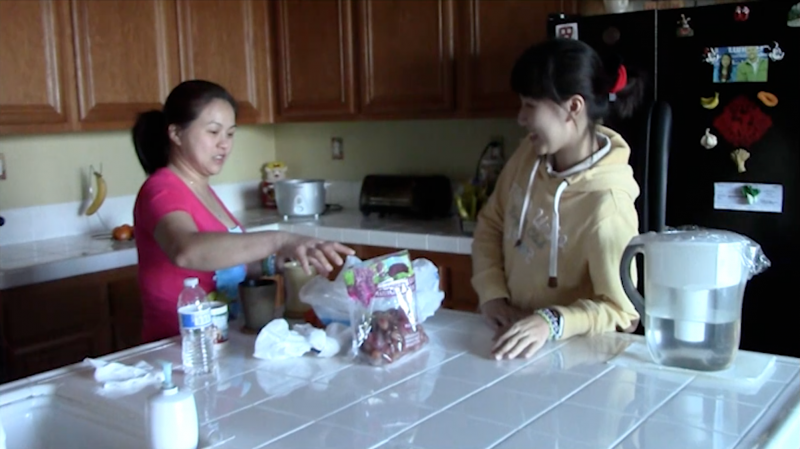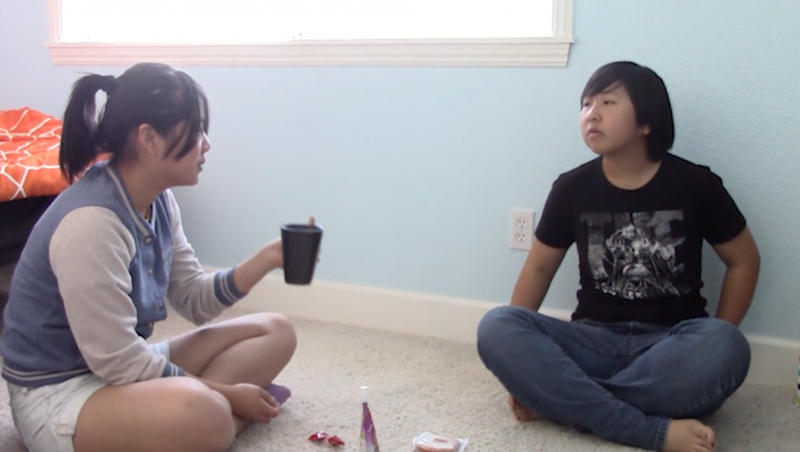Chinese Teens Move To California For A Better Shot At College

As Shuyue Xu and Miaomiao Jin left Rancho Christian High School on a Tuesday afternoon, their classmates streamed out to the welcome of parents sitting in parked cars to pick them up.
But Xu’s parents and Jin’s parents were thousands of miles away.
The two teens are part of a growing number of Chinese students who have left behind their homeland to move to the United States for high school. Students as young as 10 move in with strangers in the hope that they will be able to get into a prestigious American university and avoid the cut-throat competition their friends go through for a spot in a Chinese college.
In China, college admissions are made mainly based on a student’s performance on one test traditionally taken at the age of 18 – the National Higher Education Entrance Examination. Last year, nine million high school graduates took the exam, according to China’s Ministry of Education.
Only a small fraction made it to the most prestigious, top-tier universities, leaving many disappointed.
Many wealthy families, like those of Shuyue and Miaomiao, see the United States as an alternative place to educate their children, where universities will look just look at one overarching test score, as in China, but also at other academic and extracurricular achievements.
“It was a tough decision to send Shuyue off,” said Weiyang Lu, a single mother who divorced Shuyue's father 10 years ago.
But nothing carries more weight in Lu’s mind than her daughter’s future, said Lu, the chief manager at a local branch of a national bank.
In 2012, 15,074 Chinese students holding F-1 student visas studied at a variety of private U.S. high schools, according to a report from the U.S. Immigration and Customs Enforcement. Some used agencies to find schools in the U.S., while others relied on connections with family members and friends who lived here.
Laraine Sung, a real estate agent who also helps teens to study in the U.S., said that the growing economy in China has enabled more Chinese families to send their children to study overseas.
Admissions Director Debbie Fallon at Rancho Christian Schools in Temecula said that the schools’ strong academic commitment to students has drawn more and more international students. In total, 30 international students are studying in the school system.
“We do have some students that require a closer watch than others in the area of academics and behavioral,” Fallon said. “We have had to expel one so far.”
As studying abroad became a trend in China, some families are debating if the large amount of money is well spent.
Shuyue Xu's Story
Shuyue Xu is 18. Growing up in a middle-class family in Suzhou, she never thought she would be going to high school in California. But her mother and uncle were planning a future for her. Lu said she knew her daughter would not do well on the college entrance exam becuase she had been struggling in school. So she asked her brother, a new immigrant in Southern California, to find Shuyue a local high school. She told him she was willing to pay the $10,690 annual tuition plus $14,000 per year for homestay.
On Feb. 28, 2013, Shuyue, her mother and her grandparents boarded a flight to Los Angeles.
Shuyue first started school at Southlands Christian Schools in Rowland Heights, Calif.
Rowland Heights is one of the fastest Chinese communities in the U.S.--58 percent of the population is Asian, according to its city data website. School life was great because Shuyue felt like she was back in China.

“I cried every day after my mom flew back to China, ” she said. “I couldn’t focus on school the day when my mom left.”
So Shuyue transferred to Rancho Christian High School this past fall, where there were only three Chinese international students in her grade. Her uncle made this decision for her because he worried she was not experiencing a true American education and wasn’t being immersed in American culture in Rowland Heights.
Her weekend’s schedule is always full. Besides Korean tutorials, Shuyue' mother also pays a teacher in China to give Shuyue online SAT classes on the weekends. Lu said she wants to support her daughter’s interests and make sure she gets into an Ivy League school.
Shuyue says she is enjoying American schools, not only because she’s earning better grades than she did in China, but because the school day is shorter and she has less homework.
Her homestay family has also helped ease a painful transition. Shuyue says she feels more accepted because they share a similar cultural background.
“Lani cooks great Chinese food and always makes sure I am good,” Shuyue said.
Yet no one can replace her mother. Shuyue still video chats with her mother everyday.
“Sometimes if I can’t FaceTime her, she becomes really upset,” Lu said about her daughter.
Miaomiao Jin's Story
Jin doesn't have family in the States. Her father, Xing’an Jin, paid over $2,000 in service fees to a Chinese agency, which equals an average, annual minimum wage income iin Hunan Province, where Jin lives. Her father then pays $20,000 a year to Jin’s homestay family in Temecula.
Xing’an Jin owns an investment company in Changsha, the capital city of Hunan. He earns around two million RMB annually, which is about $330,000. He has been a big fan of the U.S. since he was young.
“The Chinese society is too money-centered, ” Xing’an Jin said. “I don’t want my daughter to become materialistic.”
Jin said he wasn't able to study in America. But now, as a father, he can afford to give his daughter the best education and living environment.
Miaomiao Jin moved to Temecula on Aug. 11, 2013. Her homestay mom is a housewife; the father an actor. They have two young dauthers.
Wearing a blue baseball jacket and a pair of jean shorts, Miaomiao doesn't look different from her fellow American high school students, but she is isolated. Although Miaomia has been doing well academically, she hasn’t been able to make many American friends. English is difficult to master and she doesn't know many of the pop singers her classmates love.
“I don’t what they are talking about or how to start a conversation, ” she said.

“Sometimes I don’t know why I came here,” Jin said. “If my dad didn’t plan this for me, I probably wouldn’t want to come.”
Ako Soykut, Miaomiao's homestay mother, is sympathetic. She had been an international student in the U.S. herself—a native of Japan who came to the U.S. for college and remained ever since.
Because of the similar experience, Soykut decided to host international students. At the same time, she could earn extra money for the family while staying at home to look after her own children.
But as the months slip by, Miaomiao slowly begins to adjust. Her family flew to the U.S. on Jan. 28 to celebrate the popular Chinese-Spring Festival with her, and she just started tennis lessons with a few new American friends on the weekends.
Shuyue and Miaomiao ended met each other last year while taking the same class and have remained friends ever since. Although they still miss home, both girls said that they were happy to have each other and are looking forward to achieving more in the spring semester, once they settle in to what it's like to go to high school in America.



